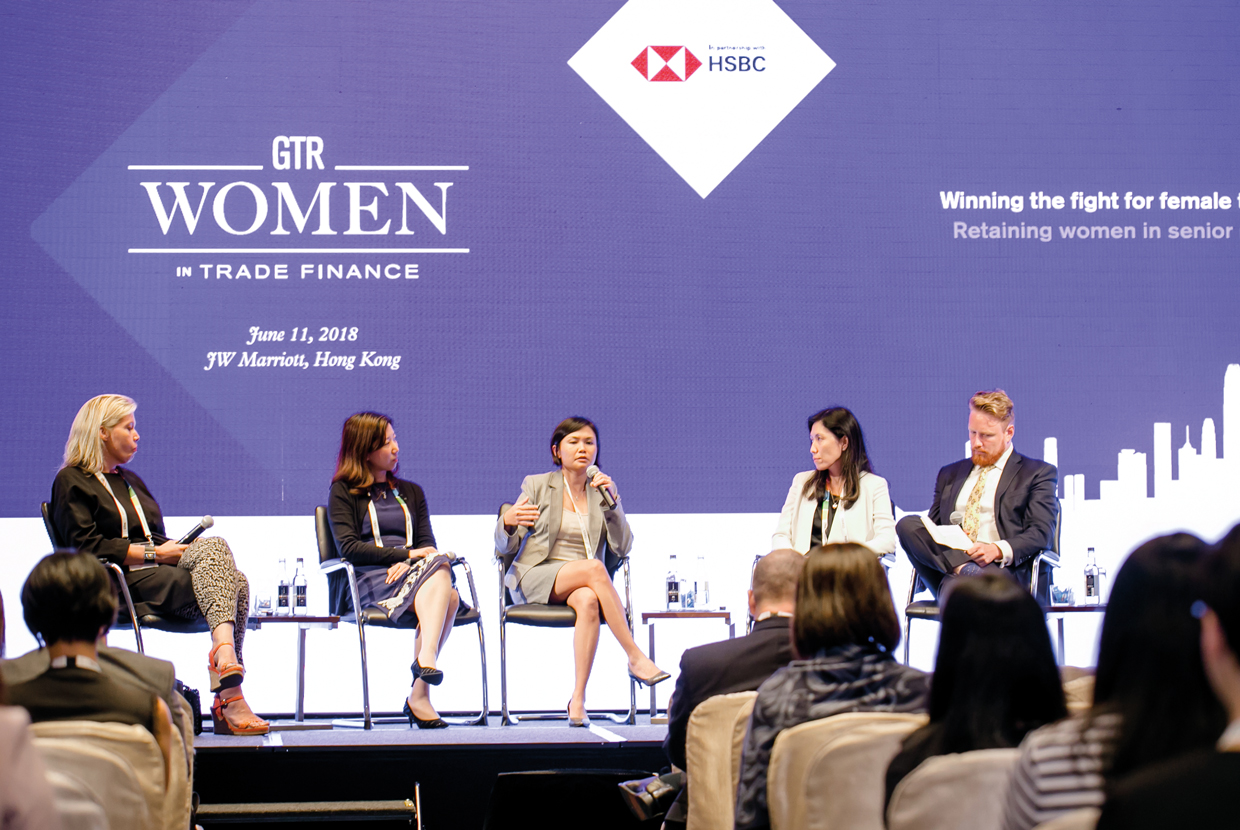GTR’s first Women in Trade Finance event in Asia uncovered gender issues with a local spin. Finbarr Bermingham reports from the event.
On a summer’s day in Hong Kong, GTR brought its Women in Trade Finance series to East Asia for the first time. Hong Kong is a hub for trade finance, and industry events are often well attended by both sexes. However, it’s clear that there are issues with gender balance in senior roles in this, and other, industries.
In Hong Kong, women earn more than their male counterparts aged 20, but that picture soon changes. Aged 30, a woman will earn on average 11% less than a man. That figure grows to 25% by the age of 50 and by the time men have hit 60, they’re earning twice as much as females (all figures courtesy of Willis Towers Watson).
At HSBC, 30% of senior roles in Hong Kong are occupied by women, according to global head of structured trade solutions, Inwha Huh. She told the audience that this is better than figures for western offices, which languish somewhere in the 20s. But the issue across the board seems to be keeping these senior women, rather than finding them in the first place.
“Whether it’s a tech company, a fintech, or a trade finance bank, it’s easy to hire women. The challenge is how to keep that pipeline going. We see that across the board. Another big commonality is that most of the women are non-frontline, non-client facing roles,” Huh said.
Again, these are not Asia-specific problems. Across the world, women leave the industry to start families and become stay-at-home mothers in their droves. However, digging a little deeper and this “leaking of the pipeline” does have certain local characteristics.
The “domestic helper” system in Hong Kong and Singapore comes with many criticisms. For one, it creates a tiered society, in which women, often from Southeast Asia, are only able to get a working visa if they live in their employer’s home. However, this infrastructure is often one of the main factors that allows women who live locally to stay in the workforce after they give birth. When it breaks down, it leads to higher attrition rates.
“Just last week, I got two resignations, because two helpers resigned. I am a mother of two and in order for me to go to work, I have to provide for my helpers and make sure they’re stable,” said Maria Hui, director and Hong Kong human resources lead at Microsoft.
In order to counter such issues, Microsoft created a period of absence – a “family caretaker leave”, whereby the employees affected could focus on their children, settle their family issues, find a new employee and then come back to work.
Maaike Steinebach is the CEO and managing director at Commonwealth Bank of Australia (CBA) in Hong Kong. She has spearheaded her bank’s efforts to provide flexible working conditions for employees so that both men and women have an opportunity to work remotely and at times that suit them, based on their own condition. Again, though, when implementing this she came up against issues that were very specific to Asian society.
“When we introduced flexible working we thought everybody would be really excited about it. The managers were supportive. But there were a few things that came out. In Hong Kong, people said: ‘We don’t really want to be working from home, because we will just be sitting at home with our in-laws. It’s going to cost us money because we have to turn on the air con during the day. Our wi-fi isn’t strong enough,” Steinebach said.
She added: “In Singapore, feedback came from a senior lady who had just adopted twins. I had suggested she work four days a week, she was so smart and productive that I felt she could easily do the work in four days. She came back and said: ‘I discussed it with my family and I want to understand: why do you want to get rid of me?’ Her family had thought it would go from four days to three days to two, and then out of the bank.”
It’s important, then, for employers and leaders to realise that not everything is transposable from western workplaces. Furthermore, it’s essential to relate to staff that these are schemes designed to boost their productivity, not efforts to undermine them.
“Maybe it’s the culture of Asia. Sometimes we provide too much flexibility and people think you’re trying to make them redundant. Management has to drive the message that this is being supportive, and not just for women, for the overall organisation, be it for fathers or mothers. As much as women have unique needs, men have their own issues too. Men often wish to stay home to take care of their parents or children,” said Ginnie Chin, the co-founder and CEO of Singapore fintech startup Cullum Capital.
Given the cultural nuances that often preclude working from home, firms should look to make the actual workplace more amenable to women with children. While it’s common to have nursing facilities and day-care in or around offices in the West, it’s less so in Asia.
“The helper system doesn’t exist in the rest of Asia as it does in Hong Kong or Singapore. What do you do to support those women? Do you put nursing facilities in the building? Do you put day-care in or around your building? It’s not common in Asia, it’s very common in the US. I see a lot of heads nodding, we absolutely want day-care in the buildings, pumping rooms in the buildings, we just don’t talk about it in Asia,” said Huh.
The role of men
While it is essential to get the support of men in the workplace, one takeaway from this event was the importance of attaining male advocacy at home, too. If circumstances change at home, why is it always assumed that the female will leave work to stay at home? In Asia, there is less tradition of “stay-at-home fathers”, but this should be an option that’s available to families.
One audience member, a senior male banker based in Hong Kong, said that he had taken four years off to help raise his family. He has tried to implement a workplace environment whereby men and women are both able to work flexibly, but found that few men have approached him to ask for support. This has the double negative effect of ensuring that the culture of stay-at-home mothers persists, but also discouraging men to ask for support when they need it – in Asia’s often patriarchal society, a stigma exists.
“Men asking for help run the risk of being called a wimp. If one of the men in the office at 4pm says he has to go home because his wife is going on a girls’ weekend and he has to take care of the kids, the whole team goes ‘Woohoo!’ If a woman goes home at 4pm to go on a girls’ weekend, the response is usually: ‘I need her signature on something, why is she going on a girls’ weekend?’ There is still a lot of unconscious bias,” Steinebach said.
Each of the panellists has had a positive experience of male advocacy in the upper echelons of bank and company leadership. However, each agreed that the situation will only be improved with buy-in throughout the organisation.
“Within the organisation, you have to make sure your managers are onboard and empowered to make the change. Often at senior management level you can broadcast a message but you can’t guarantee every employee will get onboard. If they don’t, then your cultural change project will be a waste of time,” said Hui.



















